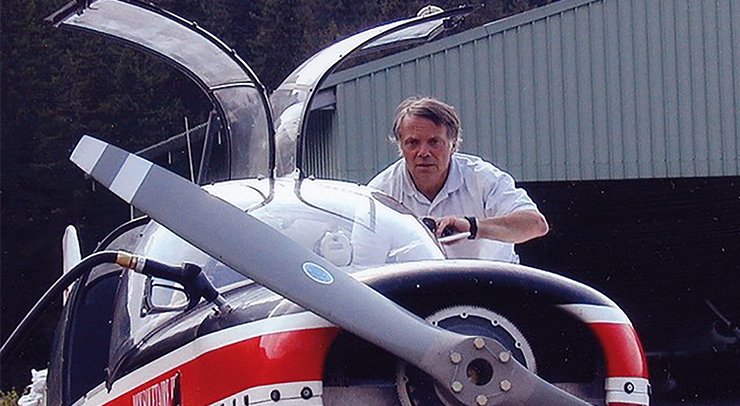Creativity and aeronautics

Jean-François Georges is Honorary President of the Aéro-Club de France. This civil aeronautical engineer, a former Dassault test-pilot, an expert in the fields of safety, is also the author of the book Blues dans les nuages published this year. Amongst his passions, jazz is in a good place. His view on creativity and creative improvisation is more than relevant.
Jean-Francois Georges is a graduate engineer from ‘Supaero’ (ENSAE-SUPRAERO)). He began his career at Dassault as a flight test engineer. He then joined the technical department and took part in the Mercure, Mirage 2000, Hermès and Rafale programmes, among others, and became a recognised specialist in safety and flight control problems. He was General Manager of Civil Aircraft until his retirement in 2003, he then chaired the Aéro-Club de France for eight years. He is also an author. «I inherited three rather pervasive passions from my parents, but I have tried to satisfy them throughout my life. There are planes, mountains and music. I was lucky enough to be able to make one of them my profession, which made things easier,» he says. For him too, the aircraft of tomorrow will have to take into account the current concerns of experts in the field: budgetary constraints, fuel economy, noise pollution… and at the same time satisfy what remains a fundamental component of travel: speed. What will the aircraft of the future look like? It will probably adopt new shapes, for example very large flying wings…? Will there still be a pilot in the plane? Will the sky be inhabited by science fiction machines?
An artistic vision of creativity
«Can you imagine that we can have within engineering schools, like UTC, a training which arouses the students’ capacity for innovation, their creativity? In the company, saying to a small team: «Go ahead, let yourself go», means: «Improvise, follow your inspiration with what you know to try to invent something. «If you leave it to the basic engineers that the schools train, for example, and I was one of them, you end up with this extraordinary fact that everything is always the same. You only have to look at the car industry, which has a certain monotony in its engineering. The vehicles all look the same. Remember when the R16 and DS19 came out in the French industry. No two rolling objects are so different. At that time there were fewer protocols and more calls for creativity. According to Jean-François Georges, the flaw in the current industry is that it lacks creative daring. This is why the idea of UTC to work on this field of creative improvisation resonates with him. «Look at the airliners. Unless you’re really in the business, it’s hard to tell them apart. Not to mention the Chinese and the Russians who arrive with exactly the same planes. It would be good to add a bit of improvisation in there too, yes. You have to let people improvise. Certainly give them a framework and tell them to go ahead!
«Improvisation is first of all culture, an education»
For the former pilot, the crash-landing by pilot Chesley «Sully» Sullenberger, in 2009, on the icy waters of the Hudson River, thus saving the lives of the 155 passengers on board, is a magnificent exercise in improvisation. An airline pilot may have to improvise when everything is perfectly in order with checklists and procedures. But not everything goes according to plan. «Frankly, when both engines stop just after take-off from La Guardia, you have to have the idea of landing on the Hudson anyway. Improvisation is first of all culture, an education. In my humble opinion, the greatest improvisation in the history of aerospace is epitomized in Apollo 13. You can’t imagine anything worse. With the scale of this incident, they must surely die. NSA brought them back alive thanks to a huge amount of rapid improvisation», illustrates Jean-François Georges. Talking about improvisation in the industry is scary at first, in a world used to processes, protocols and other methods. «However, when we explain to non-musicians what real improvisation is, namely something very well defined, strict and particularly demanding, especially in jazz music, that it is something that enriches creation rather than a slacker, industrialists can understand this and take it on board.
What about collective improvisation?
A business company’s capitalised knowledge is an ideal breeding ground to stimulate creativity. And this is the case in a great many activities, notably aeronautics and space. «This notion of improvising together in the business world seems essential to me. It is ambitious. It doesn’t mean doing anything. It’s one of the most powerful ways of generating creativity”. Business leaders can understand this today. It means knowing a whole range of techniques. I watch myself as a musician improvising. Given my age, I have accumulated a lot of musical models, conscious and unconscious harmonic transitions. I’m just bringing out things I’ve heard and assimilated. It’s not a spontaneous, ex nihilo creation, but a proposal that goes looking everywhere in your cortex for things acquired in the past, concludes the author. It’s a recreation, a regurgitation!




